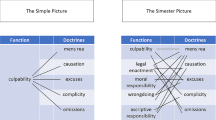Abstract
In this paper I discuss a recent exchange of articles between Hugh McLachlan and John Coggon on the relationship between omissions, causation, and moral responsibility. My aim is to contribute to their debate by isolating a presupposition I believe they both share and by questioning that presupposition. The presupposition is that, at any given moment, there are countless things that I am omitting to do. This leads both McLachlan and Coggon to give a distorted account of the relationship between causation and moral or (as the case may be) legal responsibility and, in the case of Coggon, to claim that the law’s conception of causation is a fiction based on policy. Once it is seen that this presupposition is faulty, we can attain a more accurate view of the logical relationship between causation and moral responsibility in the case of omissions. This is important because it will enable us, in turn, to understand why the law continues to regard omissions as different, both logically and morally, from acts, and why the law seeks to track that logical and moral difference in the legal distinction it draws between withholding life-sustaining measures and euthanasia.
Similar content being viewed by others
Notes
My paper will be confined to a discussion of the arguments of these two authors and, where relevant, the most recent publications on this topic. The literature in this area is vast, and it is beyond the scope of this paper to discuss arguments other than the very recent arguments provided by these two authors. I have discussed the literature extensively elsewhere (McGee 2011). An exception to this is the recent book by Michael Moore (2009), whose arguments will be mentioned where they intersect with the issues discussed in this paper.
For a detailed analysis of the concepts of “act” and “omission,” see “Ending the Life of the Act/Omission Dispute: Causation in Withholding and Withdrawing Life Sustaining Measures” (McGee 2011).
McLachlan’s view is shared by Michael Moore, who states boldly: “Omissions cannot be causes” on the basis that they are the absence of “a particular” (2009, 444). Moore’s analysis is arguably excessively burdened with philosophical terminology—it is worth noting here that it is no accident that case law has eschewed what it calls the “philosophical” conception of causation—but it seems that the basis for the claim is simply that an omission to act is an absence of any action, and only actions, rather than their absence, can have causal consequences. As we shall see later in this essay, this view stems from construing causation exclusively on the model of an agent acting on something. But “causation” is not restricted to this paradigm notion. Rather, it is also used in an explanatory sense, to explain why a consequence that normally would not eventuate actually eventuated in this instance. Omissions can be causative in this explanatory sense, for reasons we shall see.
This way of putting it is, however, somewhat forced. Laypersons with no legal knowledge don’t talk, in their ordinary parlance, of people “breaching their responsibility” to close the window, and the unnatural language used by Coggon here might make us a little suspicious. His appeal to such language certainly assists him in driving a wedge between what he regards as two separate questions, the question of causation and the question of responsibility.
The ability and opportunity will shade out, rather than abruptly end. People passing by the room, peering in and seeing the wine, technically have the ability and opportunity to do something about it. Perhaps we could still call their conduct in walking past rather than entering the room an omission to clear up the wine, notwithstanding an absence of any expectation that they should do so? But we also might construe “ability” and “opportunity” as themselves circumstance-relative, insofar as there are people in the room with a better opportunity and whom we would normally expect to take charge of the spillage. In that respect, we probably wouldn’t regard the conduct of the passersby as an omission, still less as causative of the stain on the table resulting from a failure to clean it up immediately.
It should be noted that a different controversy in that case—one we do not have the space to consider here—is whether withdrawal as opposed to withholding should be characterised as an omission. I have addressed this issue elsewhere (McGee 2011, 482–489). For the purposes of the present article and the discussion between McLachlan and Coggon, it is not necessary to address this separate issue. We can confine ourselves to a discussion of withholding only, that is, to conduct that is uncontroversially classified as an omission.
I am grateful to an anonymous reviewer for this example.
References
Callahan, D. 1992. When self-determination runs amok. The Hastings Centre Report 22(2): 52–55.
Coggon, J. 2008. On acts, omissions, and responsibility. Journal of Medical Ethics 34(8): 575–579.
Dowe, P. 2010. Proportionality and omissions. Analysis 70(3): 446–451.
Garrard, E., and S. Wilkinson. 2005. Passive euthanasia. Journal of Medical Ethics 31(2): 64–68.
Hacker, P.M.S. 2007. Human nature: The categorical framework. Oxford: Blackwell Publishing.
Hart, H.L.A., and T. Honoré. 1985. Causation in the Law, 2nd ed. Oxford: Clarendon.
McLachlan, H. 2008. The ethics of killing and letting die: Active and passive euthanasia. Journal of Medical Ethics 34(8): 636–639.
McLachlan, H. 2009. To kill is not the same as to let die: A reply to Coggon. Journal of Medical Ethics 35(7): 456–458.
McGee, A. 2011. Ending the life of the act/omission dispute: Causation in withholding and withdrawing life-sustaining measures. Legal Studies: Journal of the Society of Legal Scholars 31(3): 467–491.
Moore, M. 2009. Causation and responsibility: An essay on law, morals, and metaphysics. Oxford: Oxford University Press.
Author information
Authors and Affiliations
Corresponding author
Rights and permissions
About this article
Cite this article
McGee, A.J. Omissions, Causation, and Responsibility. Bioethical Inquiry 8, 351–361 (2011). https://doi.org/10.1007/s11673-011-9330-2
Received:
Accepted:
Published:
Issue Date:
DOI: https://doi.org/10.1007/s11673-011-9330-2



